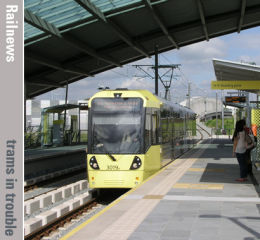Posted 20th April 2020 | 1 Comment
Cities urge financial bail-out for trams and light rail

MAYORS in provincial cities are urging the Government to provide rescue funding for their local rail and tram systems.
National Rail franchises let by the Department for Transport were suspended in March in favour of simple no-risk management contracts, while bus companies have been promised up to £397 million to maintain their services for essential travellers, although only £197 million of this is new money.
So far, however, there has been no central support for trams or light rail, where passenger figures have also fallen sharply.
Greater Manchester Mayor Andy Burnham said they were having to make ‘tough choices’. He continued: ‘While Metrolink has a proud history of operating without financial subsidy, the current crisis means that is no longer a viable or sustainable option. The government has already stepped in to bail out bus and train operators, so it is only right that a similar package is offered to light rail networks.’
Midland Metro trams are losing £1 million a month, and Tyne & Wear Metro is reported to need £10 million by July.
Jamie Driscoll, who is Mayor of the North of Tyne combined authority, warned that the Metro was accumulating large deficits.
He said: ‘Ridership is down 95 per cent, and we are losing £900,000 a week compared to the normal baseline. It is the foundation of the urban economy and essential for key workers. If we can’t operate our light rail systems, there is going to be no realistic prospect of an economic recovery.’
The Department for Transport told the Guardian: ‘We are aware of the challenges faced by light rail operators and continue to work closely with the sector and local authorities on the best solution for passengers.’
Reader Comments:
Views expressed in submitted comments are that of the author, and not necessarily shared by Railnews.

Jez Milton, Manchester
No bailouts. Taxis should be used to transport essential workers to and from work. Close local rail networks down.
Then, when we are through this, decide how many staff are still needed given that lots of demand has gone, permanently.